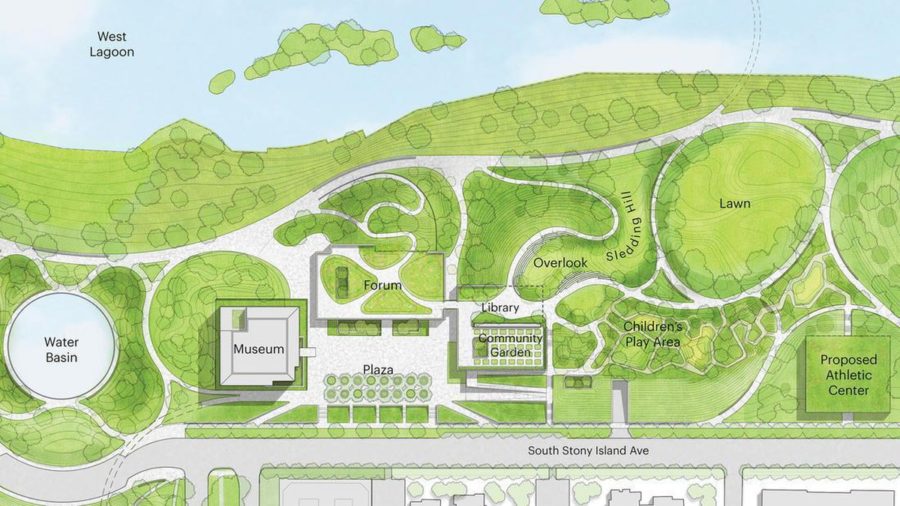The Maroon has long supported a community benefits agreement (CBA) for the Obama Center, and more advocacy is always welcome. Nearly 200 University professors have signed a letter enumerating their concerns about the location and public cost of the Obama Center. While The Maroon supports any attempt to hold the Obama Foundation accountable to the needs of the surrounding South Side community, this letter fails to advocate for the issues that matter most to the neighborhood at large.
The letter focuses on a few main concerns, including that the Center will be unable to draw new businesses to the area due to a lack of nearby retail space and that it will eliminate historic public park land. The document concludes by urging the Obama Foundation to consider other sites on the South Side which may have a more sizable impact on local economies and communities.
When the Foundation initially selected Jackson Park over Washington Park in the summer of 2015, a conversation about changing the Center’s location may have been more meaningful, but at this late stage of the planning process, such a suggestion feels impractical.
There are solutions to the problems presented by the letter that can be achieved in and around Jackson Park. Retail space may be scarce in the park itself and near the University, but the East 63rd Street corridor, which used to be a bustling street of shops, could be revitalized. The bulk of the Center will be built south of the Midway, from East 60th Street to East 62nd Street, which would make East 63rd Street a natural choice for retail development efforts.
The letter also expresses concerns that the Center will obstruct the role of Jackson Park as a “democratic urban park.” However, the published plans include a number of designated outdoor spaces meant for public enjoyment. Not only is there a large lawn area, there will also be a children’s play area, a community garden, walking paths, and a sledding hill. The introduction of public amenities won’t corrupt the sanctity of Jackson Park as a place where people can come together; it will enhance the overall experience.
The Community Benefits Agreement Coalition, with which the faculty letter is ostensibly aligned, has incorporated these hesitations and dozens of others in its Development Principles, in which they demand that the Obama Foundation reserve jobs for local residents, preserve low-income housing as property values rise, support minority-owned businesses, and partner with schools in the area. They suggest that the Foundation sponsor a black business corridor, which would also alleviate concerns about a lack of new businesses in the area.
To ensure these needs are taken into account, the Coalition hopes that the Foundation will sign a CBA, which would legally bind the Center to the promises it makes to the neighborhood. The faculty letter acknowledges the “widespread support” of a CBA but neglects to actively advocate for it as a solution.
It is imperative for interest groups across the South Side to speak up for their needs. University professors wield great influence and thus have a responsibility to use their power in meaningful, productive ways. This letter, which voices support of smaller community organizations and potential pitfalls within the current plans, is an important step toward a collaborative relationship between the Foundation, the University, and surrounding neighborhoods.
However, by focusing on relocating the Center, which is unlikely to happen at this late stage of the process, and neglecting to discuss the necessity of a CBA, the faculty letter falls short of its potential. The Obama Center will be built in Jackson Park—our responsibility now is to ensure that it is a positive influence on the South Side as a whole.
News editor Pete Grieve recused himself from this editorial due to previous Obama Center coverage.
—The Maroon Editorial Board









